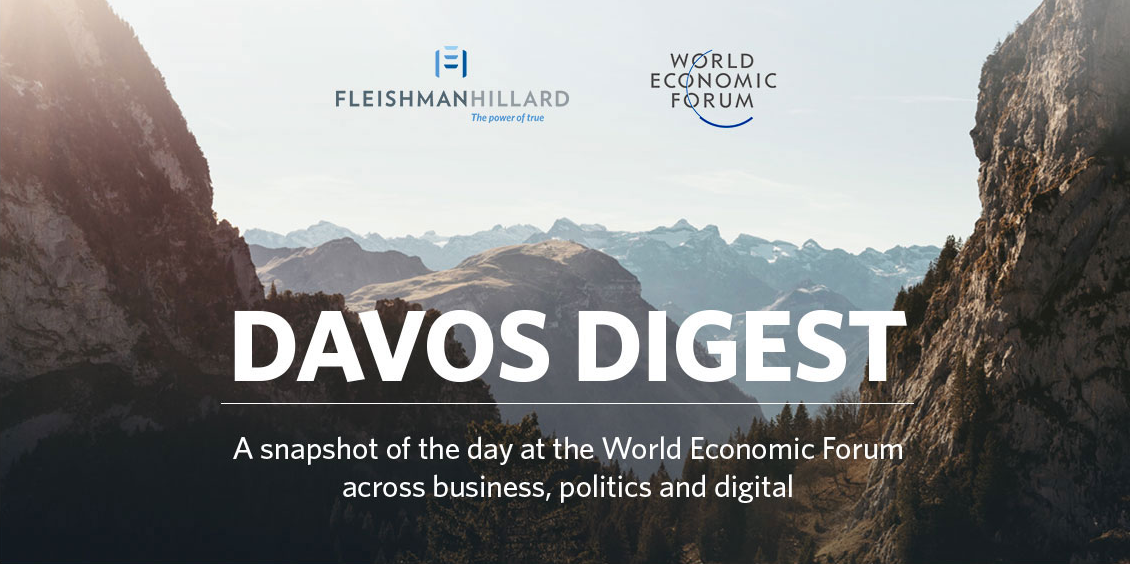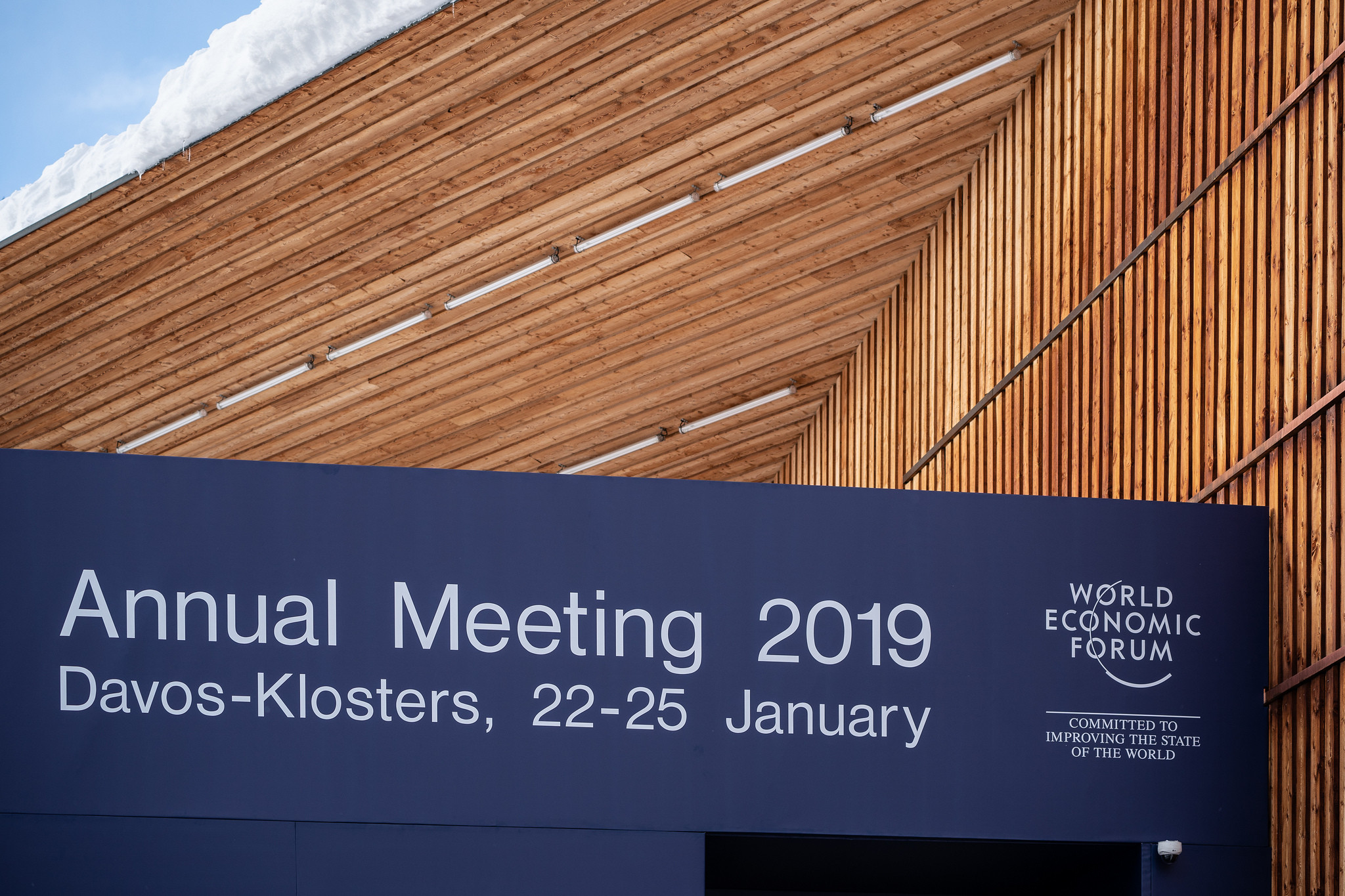Davos Digest 2019: Issue One

Welcome to Day 1 of FleishmanHillard’s 2019 Davos Digest. The world’s leaders have descended upon the snowy ski resort for the unmissable World Economic Forum – or have they?
The biggest news of this year’s gathering so far seems to be its notable absences. Donald Trump, Xi Jinping, Theresa May, Emmanuel Macron and Narendra Modi have all relinquished their prized invitations to deal with domestic problems. Many commentators are interpreting this string of no-shows as a sign of a world in crisis.
Still, the show goes on and for the 3,000 attendees at the event, Sir David Attenborough’s speech on Monday evening set the tone for one of the Forum’s major talking points – climate change. Calling for the world’s political and business leaders to take action, he declared with regret that “the garden of Eden is no more”. When being interviewed yesterday by Prince William, he went further, stating that humans can now “exterminate whole ecosystems without even noticing it”. In typical Davos irony, his speech was delivered to an audience that will be taking up to 1,500 private jet rides this week, just to attend the Forum.
Among the many criticisms levelled at Davos over the years, the subject of gender inequality has perhaps drawn the most attention. Last year, female leaders were so scarce that some of their male peers mistakenly introduced themselves to their husbands. Disappointingly, this year is only slightly improved, with women representing just 22% of Forum attendees.
This year’s official theme is “Globalization 4.0: Shaping a New Architecture in the Age of the Fourth Industrial Revolution”. Although it doesn’t roll off the tongue, it does promise another summit of clashes between populists and globalists, despite the absence of the world’s most notorious populist…
Every day for the rest of this week we’ll be sending you the latest political, business and tech news, gossip and outcomes from Davos. Here’s a quick snapshot:
 (Source: World Economic Forum)
(Source: World Economic Forum)
Who needs Trump when you have…
- Brazil’s right-wing nationalist leader Jair Bolsonaro took to the international stage to deliver a speech to a crowd of globalists. Speaking of a “new Brazil”, newly elected Bolsonaro outlined Brazil’s mission “to make progress in harmonizing environmental preservation and biodiversity, with much-needed economic development.” From what David Attenborough said earlier in the conference, we’re not too sure he would agree…
- Gone but not forgotten. While Trump cancelled the US delegation this year, Secretary of State Mike Pompeo still managed to call in via satellite to praise Trumpian economics and urge Davos attendees to copy Trump’s model of “low taxes, economic liberalism and trade reforms”. Pompeo closed his 30-minute satellite link by refuting claims that the US is isolated on the world stage.
Looking ahead in politics: Today will see a special address by Wang Qishan, Vice-President of the People’s Republic of China, from whom we can expect a staunch globalist response to yesterday’s key speakers.
Turbulent times ahead
- Doom and gloom at Davos… In contrast to last year’s record level of optimism, PwC’s 22nd annual survey of global CEOs has given us “a record jump in pessimism”. The PwC survey of Davos Man – or the ‘Humans of Davos’, as they’re now being called – shows that 30% believe economic growth will decline this year, about six times as many as in 2018.
- …is justified, perhaps? Lending credence to this pessimistic outlook, the IMF released its annual growth forecasts, and the outlook’s not good. Due to trade tensions and geopolitical changes, the IMF has downgraded global growth by 0.2 percentage points from last October. While the change is not huge, this is a recognition that there could be more turbulence on the horizon, with Bridgewater’s Ray Dalio even warning of a US recession by 2020.
- We need to talk about China. Worsening trade relations with the US, murmurs of economic slowdown and the continued controversies over the Belt and Road Initiative mean China is likely to be at the center of business-related conversation at Davos this year. President Xi Jinping won’t be there to assuage global fears and there is concern amongst business leaders, from hedge funds to chemicals, that Chinese instability will not serve them well.
Looking ahead in business: With close to $250 trillion owed to lenders, there has never been higher levels of private debt. This is particularly alarming given that this kind of debt picture was a significant contributor to the 2008 financial crash. A session entitled “The debt time bomb” will be held today to see what can be done to avoid another catastrophic recession.
Tech and a whole lot of disruption
- Canary in the coalmine. Salesforce CEO Marc Benioff has lambasted Silicon Valley for driving San Francisco into a “train wreck” of inequality, causing the rise of mass homelessness in the city. Never a man to shy away from social issues, he has been a vocal proponent of Proposition C, a bill aimed at fighting homelessness by raising taxes on big businesses.
- Who will pick up the tab left open by automation? WEF has some bad news for the US government – reskilling its workforce to survive automation and thrive in the Fourth Industrial Revolution will cost $34bn. Punishment for not showing up this year?
- Addressing the “world’s biggest challenge”: Speaking at one of yesterday’s panels, Microsoft CEO – and co-chair of this year’s Forum – Satya Nadella stressed that the decoupling between the economic and productivity growth and jobs and wages is the biggest challenge of our times.
Looking ahead in tech: Today will see top business leaders, including IBM CEO Ginni Rometty, gather to discuss the opportunities of the Fourth Industrial Revolution. Can business leaders really serve the interests of all their stakeholders while navigating a rapidly changing technological, environmental and social landscape?
Facing up to new healthcare challenges
- Predicting the future in healthcare. Takeda CEO Christophe Weber and peers took to the stage for a strategic overview of the future of healthcare. Mergers and acquisitions will be high on the agenda, alongside vertical integration on pharmaceutical companies and pricing. Greater access to data was also highlighted as means of better measuring medicine impact.
- Epidemic of hope. As epidemics have increased to nearly 200 annually, innovations in the vaccine sector hold the key to saving countless lives. A new vaccine against Ebola, for instance, would ease fears in the Democratic Republic of Congo. Johnson & Johnson VC and Chief Scientific Officer Paul Stoffels highlighted the importance of the Coalition for Epidemic Preparedness Innovations in supporting research and vaccine development.
Looking ahead in health: Prince William will take to the stage again today, this time challenging business leaders to improve mental wellbeing in their workplaces.
Join us for more insight from Davos in tomorrow’s digest.
Find Out More
-
Achieving Outsized Impact by Building Stronger Country Reputation
February 18, 2025


